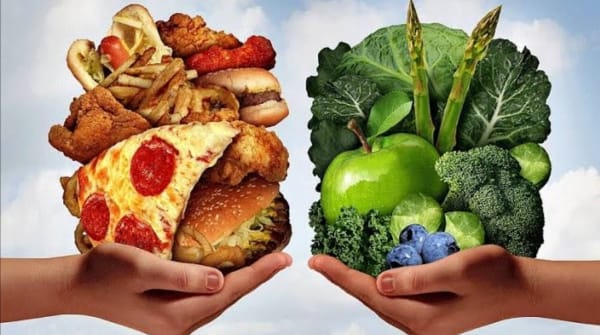A healthy diet is crucial to sustain our bodies and foster general well-being. It includes nutrient-dense foods and important vitamins, minerals, and antioxidants. Healthy eating promotes both the best possible physical and mental wellness.
Benefits of Healthy Food

healthy food vs. junk food Eating healthy food has some advantages. It boosts energy, boosts the immune system, and improves assists in weight loss, and lowers the risk of chronic disorders management. Additionally, it enhances digestion, encourages good skin, and helps with cognitive function.
Examples of Healthy Food

Fresh fruits and vegetables: Decreases the chance of chronic disease. Fruit and vegetable juices offer a variety of health advantages because they are abundant in vitamins, minerals, and dietary fiber.
Whole grains: Excellent sources of fiber for supporting digestive health include oats, quinoa, and brown rice.
Lean protein: Foods like chicken, fish, tofu, and beans are rich sources of the amino acids needed for muscle growth and repair.
Healthy fats and oils: Almonds, olive oil, and avocados are sources of lipids that are monounsaturated and beneficial for your heart.
Hydration: Staying hydrated is important since water is necessary for maintaining healthy bodily functioning. Ic illnesses and aids in weight loss
Impact of Junk Food
Contrarily, junk food describes unhealthy, highly processed foods frequently laced with artificial flavors, preservatives, and unhealthy fats. Eating junk food regularly might be harmful to our health.
Negative Effects of Junk Food
Junk food consumption can result in weight gain, obesity, and a higher chance of developing chronic illnesses, including diabetes and cardiovascular issues. Additionally, it weakens the immune system, harms mood and mental health, and causes skin problems.
Examples of Junk Food
Fast food: Common examples of fast food with little nutritional value include burgers, fries, and sodas.
Sugary snacks and beverages: Candy, cookies, soda, and other sugary snacks and drinks are high in calories and poor in nutrients.
Snacks that have been processed: Chips, crackers, and pre-packaged snacks frequently have harmful fats, too much sodium, and artificial substances.
Healthy Food Choices
Including Fruits and Vegetables: A healthy diet must include fresh fruits and vegetables. They have several health advantages and are high in fiber, vitamins, and minerals. Aim to incorporate a variety of fruits and vegetables in your meals and snacks in different colors.
Fibre and whole grains: Including whole grains in your diet is a fantastic way to increase fiber intake and improve digestive health. Choose whole grain products like wheat bread, brown rice, quinoa, and oats. Compared to refined grains, these offer more nutrients and have undergone less processing.
Lean Protein Sources: Including lean protein sources in your meals promotes muscle building, tissue growth, and a feeling of fullness and satisfaction. Pick fish, tofu, legumes (beans and lentils), and low-fat dairy products instead of fatty meats like chicken and turkey.
Healthy Fats and Oils: A balanced diet must include healthy fats. Include foods like avocados, olive oil, nuts, and seeds that are sources of monounsaturated and polyunsaturated fats in your meals. These fats absorb fat-soluble vitamins, lower inflammation, and enhance heart health.
Hydration and Water Intake: Throughout the day, drink enough water and think about hydrating foods such as fruits and vegetables with high water content. Limit your intake of sugary beverages and make water your main beverage choice.
